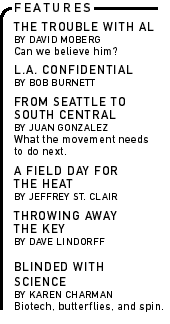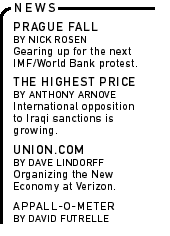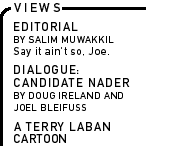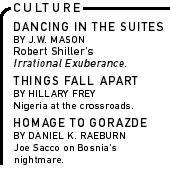 |

|

|

|

|
| |
 |
|
|
The heat in LA was oppressive: both the broiling sun and the omnipresent cops. The combined effect saturated the streets, but didn't quell the protests mounted over four days and nights at the Democratic National Convention. If the tenor of the demonstrations in LA didn't match the frenzied fury of Seattle, that was almost certainly part of the plan "This week was about issues," said John Sellers, the head of the Ruckus Society, who had only days earlier been released from jail following his bizarre arrest and confinement in Philadelphia. Sellers, an exuburant organizer, had been nabbed off a street corner by Philly cops, stuck in jail on a slate of novel charges, and hit with a $1 million bail. The transparent intent was to keep the maestro of Seattle from heading West and orchestrating havoc in LA. Sellers' attorneys got the bail reduced and their client freed. "It's not about broken shop windows," says Sellers. "What we've seen over the past 8 months is thousands of people jailed for bearing witness to the takeover of our democracy." There was a crazy coherence and palpable message to most of the two dozen rallies and marches that flooded downtown LA over the course of the week. On Saturday evening PETA dumped a load of hog manure in front of a hotel to protest factory farming. Sunday afternoon saw a rowdy march against the death penalty. Tuesday saw the largest mass arrest, when the police cracked down on a Critical Mass bicycle rally. Later that evening thousands gathered to protest sanctions against Iraq. Wednesday attention turned to the police, with a rally and civil disobedience action at the notorious Ramparts division of the LAPD. Gay and lesbian protesters staged one of the most creative acts, a mass "kiss in". Political conventions these days are mainly about image making and fundraising, not the rough-and-tumble politics and platform spats that used to be of these gatherings. So it was fitting that the first big protest of the week came together on the beach at Santa Monica, beneath the pier, which the DNC had rented for a fundraiser on the eve of the convention honoring Democratic fatcats and corporate contributors, including executives from Raytheon, Arco, Disney and Chevron. The pier was protected by a legion of cops, many of them on horseback, which led to the amusing sight of women in Versace gowns tiptoeing around horse dung. More than a thousand protesters showed up, including Doris "Granny D" Haddock, the 90-year-old political activist, who had walked across the nation last year promoting the cause of campaign finance reform. Haddock harassed the underwriters of the Democrats urging them to come down and mingle with the people and then turned to the crowd and said, "Waste your vote! Vote your heart! Be a strategic, long-term voter! You will shape the America and the world of tomorrow. It is your responsibility to do so." Early Monday morning about two thousand environmentalists and human rights activists mustered in Pershing Square in downtown LA to support the cause of the U'wa Indians of the Colombian rainforests, whose land is being overrun by Occidental Petroleum. Occidental is a company with deep historical ties to the Gore family. It's founder, the tycoon Armand Hammer, was Albert Gore Sr.'s top political patron and when he lost his senate seat in 1970, Hammer put Gore on the Oxy board of directors and made him CEO of the company's coal mining subsidiary. Hammer was also generous to Al, giving him money for his early congressional and senate runs and loaning him his private jet. Gore now controls between $500,000 and $1 million worth of Oxy stock and despite his professed environmentalism and concern for indigenous peoples he has refused to speak out against the oil company's assault on the U'wa tribe. U'wa leaders, who have traveled to the US several times in the last few years, were supposed to have spoken at the rally, but at the last minute the State Department denied the tribe a visa. The move to keep the U'wa from LA didn't surprise Terry Swearington, a nurse from West Chester, West Virginia who has been fighting the WTI hazardous waste incinerator in East Liverpool, Ohio for the past decade. Swearington, a recipient of the Goldman Prize (the environmental equivalent of the Nobel Prize) has been banned from Gore's campaign appearances. Swearington says that Gore's flacks are working hard to suppress media coverage of any blemishes on his environmental record. Danny Kennedy, head of Project Underground, the Berkeley-based group that organizes on oil and mining issues, excoriated Gore and Lieberman for having the effrontery to portray themselves as populists while attacking Bush and Cheney as the "oil ticket." "Gore's ties to big oil are just as deep and filthy as Bush or Cheney's and he has done their bidding for the past 8 years," Kennedy said. Kennedy also denounced the recent congressional approval of Clinton and Gore's $2 billion drug war package for Colombia. "The drug war is a rouse, nothing more than a way to get military supplies and advisers into Colombia to protect the interests of the oil companies." Kennedy noted that Lieberman has consistently carried water for Sikorski Corporation, the firm that makes the Black Hawk helicopters that are now slated for delivery to the Colombian military. It should also be noted that headquarters for the DNC during the convention was on the 42nd floor of the Arco building. One of the few union leaders to show up speak out at the protests was Dave Campbell of the Oil and Chemical Workers, who lambasted Oxy's anti-labor record at it's Long Beach refinery. Campbell also pointed out that Oxy owns a controlling interest in IBP, the huge meatpacking plant notorious for its monopolistic practices and shoddy working conditions, Tom Hayden summed up, saying that the crowds in LA "had shaken the authorities to their foundations" and he urged the demonstrators to continue to act defiantly by "standing up for what they can't stand." That first march through the cavernous streets of LA came to typify much of the street action for much of the week. The protesters carried large puppets and signs, crafted at the Convergence Center, a makeshift protest factory and flophouse, near McArthur Park. A carnival atmosphere pervaded the crowd as they sang and chanted taunts at Gore. Even the anarchists were on their best behavior. The dreaded Black Bloc marched arm-in-arm down the street, some of them actually singing songs. Of course, the attire of the street warriors made them easy targets for the LAPD riot squads, who shadowed their every step, often outnumbering them by 5 to 1. On occasion the cops seemed to mistake the anarchists for representatives of the Zapatista rebels, dressed in their traditional black clothes and ski masks. But the prospect of harassing Mayans instead of young white anarchists didn't seem make much of a difference to the cops. The anarchists only outburst of violence was reserved (rightly) for the press, surrounding one photographer who had persisted in snapping close-up shots of them despite their protests. As the anarchists smashed his camera, the more cautious protesters shouted, "No violence! No violence!" Overhead eight helicopters buzzed around LA's glossy skyscrapers, battling for the best view of the scene unfolding below. This was also a common sight over the next four days as the choppers swept from protest to protest. The TV news stations even generously offered to provide a seat on their for members of the LA cops and the FBI. As the march approached the Staples Center, one affinity group of about 12 people, mainly women, stayed behind and tried to temporarily block an intersection, by sitting down in the street and linking their arms. A burly sergeant for the LAPD approached and yelled at the 12 protesters: "Get your asses up and get back, now. If you don't, you sure as hell know what's going to happen." After a few minutes, the group moved back, slowly. But it happened anyway. Unprovoked, a wedge of cops, dressed in their black ninja gear, darted forward to attack the group, batons pounding away at the backs and legs of the demonstrators. One woman fell to the pavement and hit her head on the curb, opening a deep gash above her eye. An attendant at a nearby shop rushed into the street, pulled the woman inside his store and tended her wound. "I was only doing what they ordered me to do," said Valerie Lyons, an Indian rights activists who had traveled to LA from Minot, South Dakota. "Then they whacked me hard in the back of the knee twice and I just collapsed." Later that evening, while Clinton delivered his own political eulogy, Rage Against the Machine played a raucous set for about 15,000 demonstrators outside the Staples center in the "legal protest zone", a parking lot cordoned off by an eight foot tall fence tipped with concertina wire. As part of the preparation for the convention, the LA Department of Public Works deforested much of the Staples Center grounds, uprooting about 100 trees and shrubs (assuredly the most aesthetic feature of the gaudy convention center). The convention planners argued that the trees might be used as weapons against the police or demonstrators. Soon after Rage finished a couple of young protestors climbed the fence near the Staples center, waving an anarchist flag and taunting the police. The LAPD used this as a pretext to give an order for the crowd to disperse and cut the power to the stage. The crowd booed but began to amble out of the fenced-in lot. Then the cops began showering the fence line with pepper spray, trying, the cops claimed to get the anarchists off the fence. A few bottles and chucks of concrete were tossed back, falling fair short of the cops and then all hell broke loose. About a hundred cops on horseback drove into the crowd trampling more than a dozen people. Behind them about 500 cops carrying guns began to strafe the crowd, firing for more than 45 minutes. "We were moving out, doing exactly what they said and they still shot us," says Ramon Martinez, a farmworker organizer from Stockton, who was hit four times in the neck and shoulders with rubber bullets. Martinez said that the exit route out of the protest area was blocked by a line of police firing guns, thus the crowd was forced to huddle in the intersection of Figueroa and 11th street as the bullets flew. The demonstrators weren't the only ones shot. More than a dozen journalists were also hit by the LAPD, including TV crews stationed on top of a nearby building. One of the journalists struck by an LAPD bullet was Al Crespo, a photographer for the Associated Press. Crespo was standing on the sidewalk near the entry to the Figueroa Hotel when he saw through his viewfinder a cop aiming a rifle at him. As he snapped the photo, the cop fired and the bullet hit Crespo in the left cheek, grazed his temple and tore through his earlobe. "The protesters were mostly shot in the back," says Crespo. "The photographers and reporters were shot in the head." At about the same time that the cops were cracking heads at 11th and Figueroa another strike force had been dispatched to Patriotic Hall, the Beaux Arts building a few blocks north of the convention center that was hosting Arianna Huffington's Shadow Convention and the Independent Media Center. Everyone was forced out of the building and the power was pulled on the Indy Media Center, temporarily blacking out coverage of the convention and the police crack down. The cops justified their raid by saying an informant had told them that C-4 explosives had been planted in the Hall. This bogus tactic had been used successfully in Washington and Philadelphia as a pretext to raid protest centers in both cities. On Wednesday, the protests turned on the police, highlighting the LAPD's reign of terror. Several thousand marchers gathered at MacArthur Park early in the morning and walked through the 95 degree heat to the infamous Ramparts division headquarters, the scapegoat for the systematic brutality and corruption of the LAPD. It was an odd scene. The Ramparts division building was wrapped in a blue sheet of plastic, as if Christo had stopped by in a somber mood. There's an ATM sign above the steps of the building. "They put that cash machine in there to suggest that it's the only safe place to withdraw money around here," a resident explained. "What the fuck happens when you leave the building? They don't say shit about that." The protest itself was as orchestrated as a ballet, every detail worked out in advance with the cops, with officials from the Justice Department looking on in a mock display of oversight. Of course, the Ramparts cops were on their best behavior, scrupulously adhering to every constitutional right as they read the 38 people who sat down on the steps of the building their rights and gently scooped them up and carried them away into the building. "This is a gringo protest," chuckled Gilles Perez, a photographer from Paris, who has covered the Rwandan civil war and protests across Europe and Latin America. He was right. At least 90 percent of the demonstrators where white and all but one of those arrested where white. There was no taunting of the police, never any sense that things might get out of hand, no real hint of outrage or danger. In the end, the image left by the protest was not of an out of control police force that routinely files false warrants and affidavits, steals drugs and money from arrestees, beats up suspects and kills unarmed people. Instead, the Ramparts cops came off as restrained and even passive peacekeepers. Leave it to the LAPD to fuck up a rare opportunity for good press. As the protest at the Ramparts station fizzled out, the marchers regrouped and headed back toward the caged in protest area near the Staples center in an attempt to distract attention from Joe Lieberman's acceptance speech - a speech that would echo Gore's call for 50,000 new cops and tougher police tactics nationwide. As demonstrators headed down Figueroa Street, they were met by a line of cops wielding riot clubs, who apparently wanted to keep the protesters from disturbing delegates who were then beginning to wander toward the convention hall. After a short standoff, a wedge of about 20 cops suddenly charged the crowd, poking the frontline of demonstrators with their metallic batons, often aiming brutal jabs at the solar plexus. Six or seven people fell to the pavement where they were savagely beaten. Three of the fallen were women. One of the women was a sound technician for CNN. The cameraman videotaped the beating, which soon broadcast on Larry King. King confronted a spokesman for the LAPD about the attack. The pr man apologized for the injuries sustained by the sound technician, saying: "Sometimes mistakes are made in the heat of battle." For his part, King evinced no concern for the other victims of the police who were as badly beaten as the CNN employee. But there was no battle - only an unprovoked attack by police. "I was taking a drink of water when one of them hit me in the stomach with the tip of his baton," says "Cedar", a 20-year old student and Earth First!er from Eugene. "I couldn't breathe and I just dropped to the ground and this one cop kept flailing at me until three others pulled him off." No one had attempted to block access to the convention center. No one had tossed a water bottle at the police line. No one had thrown a brick through one of the windows of Cesar Pelli's garish phallus, the Citicorp Tower. Of all of the police actions during the week, this one seemed the most likely to have been directed by the DNC itself, which did not want anything to delay or distract attention from the primetime roll-out of Lieberman. Al Gore resembles no recent politician so much as Hubert H. Humphrey. The similarity is not so much in ideology or rhetorical style as in desire. Both were consumed for decades by an obsession to become president and willing to trample anyone and any cause to get there. LA wasn't Chicago 1968, though the LAPD did its best to emulate Daley's goons. For one thing, the convention itself had been purged of dissent, the delegates were as programmed as a laugh track for a sitcom. Even liberal insiders were being shunted aside. On Thursday night, just prior to Gore's speech, a "Move out of the way, VIPs coming through," the burly cop screamed, emphasizing the point by throwing his elbow into the chest of Harold Eckes, the former liberal adviser to Clinton, and me,. We were penned against the fence while Hollywood director Ron Howard and his entourage moved passed. "Times change, eh Harold?" A half an hour later, Howard and others would applaud wildly when Gore recounted his tour of Vietnam, vote for the Gulf War, tough stand on crime and role in dismantling welfare. There's not even much pretense left to the new Democratic Party. It wasn't even the LA of 1960, when Adlai Stevenson's supporters and convention delegates rioted in what is now the parking lot/official protest zone of the Staples Center. What LA was about, in the end, was a continuity of resistance and dissent, a movement that exploded onto the scene in Seattle (as unexpected as the Zapatista uprising in Mexico in 1994) and resurfaced in DC during the IMF/World Bank protests and in Philly at the Republican Convention. Despite the absence of organized labor, the loosely knit of greens, peace activists, farm workers, public transportation advocates, working people angered at anti-labor free trade pacts, gays, lesbians and AIDs activists, death penalty opponents, and dozens of other groups and movements that have been abandoned and betrayed by the leaders of the Democratic Party. But the Democrats and the Republicans ignore what's happening in the streets at their own peril. Few seemed to get this. One that does is Rep. Cynthia McKinney from Georgia, who said her heart was with the people in the streets. "I commend today's 'street warriors' for standing up for what they believe in, and knowing that civic engagement is the American way. Let us all do our part to engage and create positive and progressive, social, economic, and environmental change. We need global justice or else 'Workers of the World Unite!' will become more than just a hackneyed slogan; it'll become the only way to survive." |
